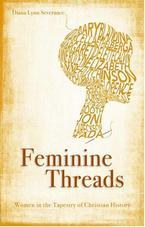
Feminine Threads: Women in the Tapestry of Christian History, Diana Lynn Severance (Ross-Shire, Scotland: Christian Focus, 2011) 336 pp. $15 ($12 on Amazon; or $11.39 on Kindle)
Overall, the book is challenging and informative for me as a male Christian. I have been mostly ignorant of the many deep and lasting contributions of women throughout the history of the church. The fascinating chronicles informed me to be full of admiration for these particular women, and for Christian women throughout the world today who struggle for basic human rights. I recognize that women continue to be disregarded, demeaned, patronized, minimized, and marginalized in evangelical churches and Western cultures today. SeveranceŌĆÖs book is the beginning of a helpful corrective for the church to value women as equal heirs of the gift of grace.
I picked this book up at ETS and have thoroughly enjoyed working through it slowly. It is history, recounted by a responsible and wise historian (PhD, Rice University), so I have taken it in small chunks rather than reading whole chapters at one sitting. The author writes with slight commentary and a complementarian perspective, occasionally refuting what she calls feminist appropriations of one or another woman in the history to support an agenda. This approach will not please every reader, but the author has proven to me that she is a reliable guide to the history as a responsible historian who is sensitive to and respectful of women while maintaining a strong allegiance to the conservative interpretations of the Bible.
The focus on individual women is interesting and enriching (over 100 are treated with mini-biographies and listed by subheadings in the table of contents). Additionally, the author adds helpful discussions of the historical context as relevant for understanding the lives of the exemplary women reviewed. The book proceeds chronologically, with chapters devoted to each era. Severance includes topics such as marriage and family in every era, and then as relevant to an era she treats persecution and martyrdom, womenŌĆÖs ministry as widows and deaconesses, legal changes that concerned women, asceticism, monastic rules, clerical celibacy, prison reform and nursing, the Sunday School missions, abolitionism, and more.
The presentation is vivid with all things relevant to knowing the women of the church throughout the ages by their writings (catechisms, poetry, hymns, pamphlets, theses, and letters), their contributions to others (such as being the influential wives to husbands and formative mothers to children), according to the thinking of others in their day about womenŌĆÖs virtues (such as Cotton MatherŌĆÖs pamphlet on women) or the writings on what Christian women should aspire to, and their institutional accomplishments in prison reform, nursing, education, missions, abolition of slavery, civil rights, and etc.
Severance frequently illustrates the thinking of women by excerpts of their writing. She gives a sense of the magnitude of womenŌĆÖs accomplishments by noting the restrictions in the church and the society for women to gain education and establish institutions that enriched society. For example, in rehearsing the accomplishments of Catherine Beecher (1800-1878, sister to Harriet Beecher Stowe), the author notes that CatherineŌĆÖs publication, Letters on the Difficulty of Religion (1836), was received this way: ŌĆ£Many ministers and church members were shocked that a woman could plunge into such deep doctrinal areas with such competenceŌĆØ (272).
Frequently I had the impression that we have come a long way from the longstanding repression of womenŌĆÖs contributions in church and society. We still resemble some historical restrictions that are open to critique in the church.
Severance is not always glowing in her presentation of female heroes of the faith, which makes her trustworthy as an historian. I read one review of the book that takes Severance to task for going too far in glowing about some women without addressing their failings. I figure that no history is perfect, and I was glad for the authorŌĆÖs overall thrust at balanced presentation. I found some statements to be polemical against feminist readings, but this was easy to overlook as her agenda, and a slight one when the whole of the book is considered. She measures critique of the theological problems in the writings and personal practice of some, such as the late medieval mystics, and the leaders in the womenŌĆÖs rights movement.
The final chapter brings the contributions of key women up to the present day, ending with Ruth Graham, Edith Schaeffer, and Joni Earckson Tada. Along the way, Severance surveys the three waves of feminism and the mobilization for womenŌĆÖs rights. This chapter was partly reminiscent of Mary KassianŌĆÖs book, The Feminist Mistake (2005) that traces the historical and theological developments of the womenŌĆÖs movement. Severance has her critiques to offer, which I think are appropriate at many points, according to a complementarian interpretation of biblical passages.
Recommended by Dorothy Kelley Patterson, Richard Bewes, Carolyn McCulley, Faith Cook, Michael A. G. Haykin, Carrie Sandom, and Timothy George.
Here is Michael A. G. HaykinŌĆÖs commendation:
ŌĆ£Christian historians in the past have not always been as faithful in their calling as they could have been, for frequently they forgot one half of the story of GodŌĆÖs Church, namely, the role of women in it. Diana SeveranceŌĆÖs study is therefore a welcome one, for with lively prose and scholarly care she has given us an excellent overview of the various ways in which Christian women have sought to live for Christ. A must read for all who are interested in the riches of Christian history.
 51┬▄└“
51┬▄└“
.jpg)


.jpg)